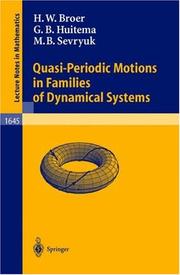| Listing 1 - 3 of 3 |
Sort by
|

ISBN: 3540620257 3540496130 9783540620259 Year: 1996 Volume: 1645 Publisher: Berlin: Springer,
Abstract | Keywords | Export | Availability | Bookmark
 Loading...
Loading...Choose an application
- Reference Manager
- EndNote
- RefWorks (Direct export to RefWorks)
Differential geometry. Global analysis --- Flows (Differentiable dynamical systems) --- Flows (Differentieerbare systemen) --- Flows (Systèmes dynamiques différentiables) --- Hamiltonian systems --- Hamiltonsystemen --- Perturbatie (Wiskunde) --- Perturbation (Mathematics) --- Perturbation (Mathématiques) --- Systèmes hamiltoniens --- Tore (Geometrie) --- Torus (Geometry) --- Torus (Meetkunde) --- Hamiltonian systems. --- Flows (Differentiable dynamical systems). --- Perturbation (Mathematics). --- Torus (Geometry).
Book
ISBN: 9789087041946 Year: 2012 Publisher: Hilversum Verloren
Abstract | Keywords | Export | Availability | Bookmark
 Loading...
Loading...Choose an application
- Reference Manager
- EndNote
- RefWorks (Direct export to RefWorks)
378.4 <492> --- 378.4 <492> Universiteiten--Nederland --- Universiteiten--Nederland --- History of physics --- anno 1910-1919 --- anno 1800-1899 --- anno 1900-1909 --- Netherlands --- Natural history --- Science --- Natural science --- Science of science --- Sciences --- History --- Postma, Obe, --- Natural sciences
Dissertation
Year: 2018 Publisher: Leuven KU Leuven. Faculty of Engineering Science
Abstract | Keywords | Export | Availability | Bookmark
 Loading...
Loading...Choose an application
- Reference Manager
- EndNote
- RefWorks (Direct export to RefWorks)
With the transition of energy supply from controllable fossil fuel based generators to more sustainable options, aggregators are developing to be one of the new stakeholders to inject more flexibility in the new energy sector. An aggregator brings together residential, commercial and small industrial demand response (DR) and distributed generation, as a Virtual Power Plant (VPP), to actively participate in electricity markets and enter demand response programs offered by the operators of the energy system. Two main barriers for these aggregator services have been identified: Knowledge of VPP characteristics and determining the value of aggregator services. This leads to the main research question addressed in this dissertation: How can the value of aggregated flexibility be assessed?To assess the value of a VPPs' flexibility, large sets of data are required to adequately evaluate its potential. This was addressed by developing a set of device and user models which realistically simulate a residential VPP at a resolution of under a minute, configurable to cover most residential devices, capable of smart control, scalable to large numbers of devices and validated with measured device data. Using these models most types of residential VPPs can be realistically simulated. From here, to determine the value, the characteristics of a VPP must be quantified to determine which services a VPP is capable of offering. Barriers such as end user privacy and processing time, limit the use of low level, system specific, data. Therefore. a black box forecasting model to estimate the characteristics of a VPP, namely flexible capacity, was developed using only top level aggregated information. A sensitivity analysis of the artificial neural network (ANN) model was performed by investigating the impact of VPP makeup on its performance error. It was shown that for all VPPs the error was at most 10% confirming the versatility of the forecasting model for residential aggregators. Finally, a mathematical set-up to determine the value of a VPP’s flexible capacity on the wholesale energy markets was defined. Using this formulation, a methodology to assess internal VPP as well as external influences, such as market design and environmental factors, on the potential value is presented. Finally, by this methodology two trading algorithms were assessed to determine how to improve trading. It was shown that with the assessment the performance is improved by 36%.
| Listing 1 - 3 of 3 |
Sort by
|

 Search
Search Feedback
Feedback About UniCat
About UniCat  Help
Help News
News